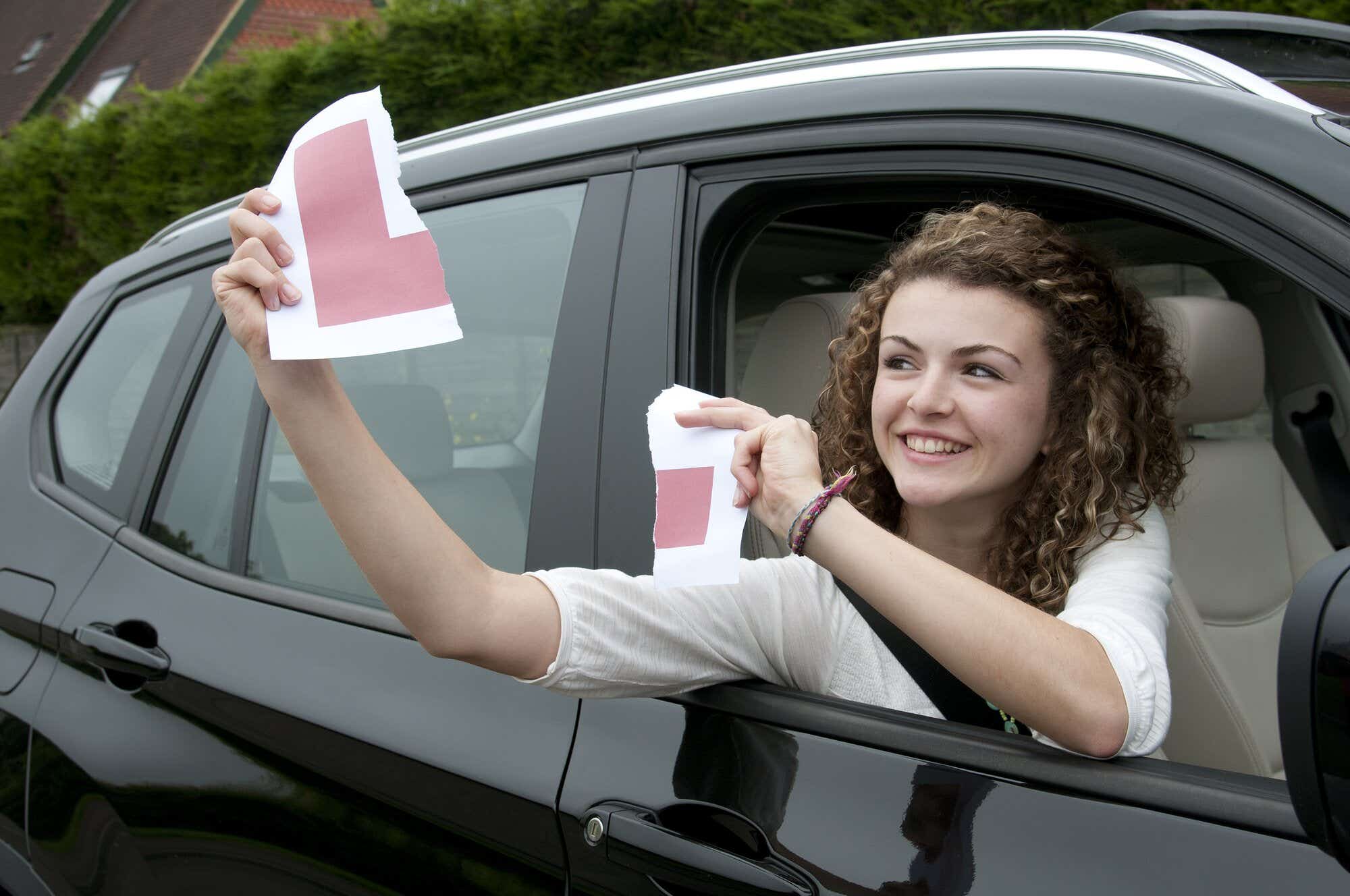Get learner driver insurance
Compare learner driver insurance policies with our partner Tempcover*
Most people learn to drive in a car owned by an approved driving instructor, but many will also choose to supplement their lessons with independent practice in a friend’s or family member’s car.
Learner drivers will be automatically covered by their approved driving instructor’s insurance. But they will need to take out additional insurance, known as temporary learner driver insurance, or be added as a named driver if they want to use a friend or family member’s car.
Being added as a named driver has a number of drawbacks, however. For a start, the policyholder’s insurance premiums are likely to rise due to the added risk. Secondly, should you need to make a claim, this could cost the policyholder their no-claims bonus.
For this reason, temporary learner insurance can work out to be a cheaper - and more convenient - option. Especially if you’re only thinking of only using the car for a short period or occasionally.
What is temporary learner driver insurance?
Temporary learner driver insurance can insure a provisional driver on a friend’s or family member’s car while they gain valuable driving experience. You can choose cover from just a few hours up to six months, depending on the policy. Many policies are flexible, allowing you to top up as you go.
The benefits of temporary learner driver insurance include:
It’s completely separate from the main driver’s policy
If you have an accident, it will not affect their policy and the car owner won’t lose their no-claims bonus
How temporary learner driver insurance can help you pass your test
Extra driving practice can save money on lessons — many experts recommend at least 47 hours’ driving practice, with professional lessons costing an average of £24 an hour.
If you are able to get some practice in a friend’s car you may be able to reduce the number of professional lessons needed, gaining valuable real-life driving experience as well as saving money on tuition.
Get learner driver insurance
Compare learner driver insurance policies with our partner Tempcover*
Do I need temporary learner driver insurance?
To take to the road, every driver needs to be covered by an adequate insurance policy.
You don’t need to buy learner driver insurance to take lessons in an approved driving instructor’s car, as your cover will be included in the cost of your lessons
However, if you want to practise in a friend’s or family member’s car, you will need to arrange your own insurance.
Where can I get temporary learner driver insurance?
While learner drivers will be accepted by some standard temporary insurance providers, there is also specialist temporary insurance just for provisional drivers.
How long does short term learner driver insurance last?
Short term learner insurance covers you for longer than a standard temporary insurance policy:
You can choose cover for 30, 60 or 90 days, or longer
You can take out a policy to take you up to the day of your driving test so you can get as much private practice as possible with an experienced driver
If you don’t pass your test and need more practice in your friend’s or family member’s car, you can simply take out another short-term policy
How old do I have to be to take out temporary car insurance for learner drivers?
Temporary learner driver insurance can be found for people aged between 17 and 75.
But remember that if you’re borrowing someone’s car, you can’t drive on your own until you have your full licence.
You need to be accompanied by someone over the age of 21 (or 25 in order to be covered by some insurers) who has had their licence for three years or more
You’ll also need to display L plates on the front and back of the car, and avoid driving on motorways
What does temporary car insurance for learner drivers cover?
Most temporary insurance policies for learner drivers offer comprehensive cover.
This means that in the case of an accident your insurer will pay out for damage to the car you are driving, not just for other vehicles involved (which is the case in third party cover).
Can I get temporary learner driver insurance for my own car?
Yes, if you’re lucky enough to own your own car, you can still take out temporary learner insurance. However, there may be restrictions on the type of vehicle that can be covered. For example:
Cover may be limited to cars up to a certain value — usually £30,000 or in insurance group 30 and below
You may find it difficult to get temporary insurance cover for a modified car or if you have previously made a claim on a car insurance policy (such as a previous temporary policy)
Remember, too, that you will need to drive the car with someone who is over the age of 21 who has held a full driving licence for at least three years.
What is the cheapest learner driver insurance?
Taking out a learner driver insurance policy can be an affordable alternative to being added to a friend’s or family member’s policy.
The cost of your cover will depend on:
Your postcode
How long you want to be covered for
They type of car
What excess you have, which is usually set at £250 for learner drivers
How do I compare temporary learner driver insurance?
You’ll need to know the car’s registration number (or details of make and model if you don’t know this), details of your licence and driving history, and personal details including your name and address.
Can my parents insure me as a learner driver on their car?
Some learner drivers choose to be added as a named driver on someone else’s policy, commonly a parent’s, but as mentioned earlier, this is not always the cheapest option.
This can also put the policyholder’s no claims bonus at risk, as they will need to claim on their policy if the learner driver is involved in an accident in their car.

Temporary learner driver insurance – your questions answered
How do I claim on temporary learner driver insurance?
If you have an accident, you will need to claim through your temporary insurance company who will arrange any repairs or payouts required.
Can a claim on my temporary learner driver insurance affect me?
If you do have to make a claim on a temporary learner driver insurance policy, you will need to declare this to insurers in the future. This may increase the cost of your insurance, but it’s crucial that you are honest, otherwise your policy could be invalidated and any future claims could be rejected.
Do I need to own a car to take out learner driver car insurance?
No, temporary learner driver insurance is designed to cover drivers who have not yet passed their driving test, so have not got their full driving licence.
If you're looking for provisional driver vehicle insurance it pays to compare learner driver car insurance quotes to see what deals are on offer.
Is learner driver insurance expensive?
It will be, pro rata, more expensive than standard car insurance. This is because learner drivers are considered more risky – accidents are more likely when you are learning to drive and the excess – the amount you have to pay before any insurance claim is paid – can also be high.
Get learner driver insurance
Compare learner driver insurance policies with our partner Tempcover*
Can I learn to drive using temporary learner insurance?
Yes you can keep costs down by practising in a friend’s or parent’s car – which is when you will need insurance
When taking lessons with a registered ADI (Approved Driving Instructor) you will be automatically insured as part of the cost of your lessons.
Many insurance providers will let you take out temporary provisional car insurance for a day up to 140 days, which should generally be cheaper than an annual policy on someone else's insurance.
What are the cheapest ways of learning to drive?
Learning to drive can be costly, so you’ll need to weigh up which option best suits your needs.
Paying a professional driving instructor
Pro: if you have regular lessons you can cut out the need for learner driver insurance, as the lesson fees cover the cost of them being insured on your behalf.
Con: the cost of getting professional lessons can add up quickly, with many instructors charging between £25 and £35 anr hour.
Learning with friends and family
Pro: if you have family or friends willing to accompany you in their car on a regular basis, you could save on driving lessons.
on: you will need to be added as a named driver on their insurance policy, and you may take longer to pass your test.
You may need to plan a few months in advance where you know you'll be available to take all of your lessons. Otherwise, there is the risk that if you don't keep up your driving lessons regularly, you'll fall behind in some of the things you've learnt.
What is the cheapest way to insure a learner driver?
Some car insurance providers are more willing to take on provisional drivers. If you have family or friends willing to help you, first check how much their insurer might charge to add you as a named driver.
Warning – provisional car insurance and fronting Some parents take out a car insurance policy and declare themselves as the main driver, adding a young driver as a named driver. This is despite the fact that the child will be driving the car more than the parent, this is known as 'fronting' and is illegal.
How does learner driver insurance work?
If you're lucky enough to have your own car and want to get insured as a learner driver, you can simply take out an insurance policy as normal, making sure to inform your provider that you are yet to gain your full licence.
This will cover you for up to 12 months while you prepare to take your test
If you pass within this time you will need to inform your insurer as they will amend your policy to reflect this – your premium is likely to rise once you have passed your test
The cover is normally fully comprehensive, which will cover accidents as well as theft, fire and malicious damage
You may even be able to build up your own no claims bonus while driving on a provisional licence
How can I save on provisional driver’s insurance?
The best way to achieve long-term savings on your car insurance is to take out your own policy while you are still driving on a provisional licence.
You will be able to start building your no-claims bonus even before you have passed your driving test
Once you start building your no-claims bonus your premium should drop steadily each year as long as you don’t make any claims
Taking out an insurance policy in your own name means you will also avoid the risk of damaging your friend’s or relative’s no-claims bonus as you might if you had to make a claim as a named driver on their policy
if you take out your own insurance policy, there should be no impact on the main driver’s insurance premium.
How to find cheap provisional driver’s insurance
If you're looking for learner driver insurance for your own car and need a provisional driver insurance quote, there are a couple of issues to consider.
Check what kind of car you drive
The type of car you drive will often have an impact on the amount you pay for insurance – but with provisional driver’s insurance most policies will cover you for any car up to a certain value or insurance group (usually a value of £20,000 or around insurance group 30).
This is great if you want to learn in your parents’ car and then you can choose a cheaper car to insure once you’ve passed your test.
Make sure you tick the right box
When you are looking for cheap learner driver insurance, make sure you have ticked the box for provisional rather than full licence if you’re buying or comparing policies online.
But be prepared to pay more for learner driver insurance
Once you’ve passed your test you may be considered as more of a risk as you are no longer required to be accompanied at all times by an experienced driver, and there’s the added risk of driving on motorways.
Always compare quotes first
By getting quotes from more than one provider it's possible to get learner driver cover for the equivalent of a couple of pounds per day. The best learner driver insurance is one that offers good value and sufficient cover for your needs.
How to get car insurance when you don’t own a car
When you get your full driving licence you may not immediately want, or be able to afford, to buy a car. This doesn’t mean you can’t drive at all.
You can choose to take out a temporary car insurance policy using someone else’s car, as long as you have their permission. Compare quotes for short-term or temporary car insurance to get started.
When you do come to buy your first car it may be worth taking out a group car insurance policy if people in your family drive and own cars.
This is called multi-car insurance and might also be suitable:
If you own more than one car
If you’re a family with more than one driver
If you’re a couple with more than one vehicle
Get learner driver insurance
Compare learner driver insurance policies with our partner Tempcover*
Read more …
The learner driver insurance comparison service is provided by tempcover, registered in England (9923259) and authorised and regulated by the Financial Conduct Authority (746985). Registered address: 2nd floor, Admiral House. Harlington Way, Fleet, Hampshire, GU51 4BB. By using this system you are agreeing to our Terms and Conditions and Privacy Policy.

